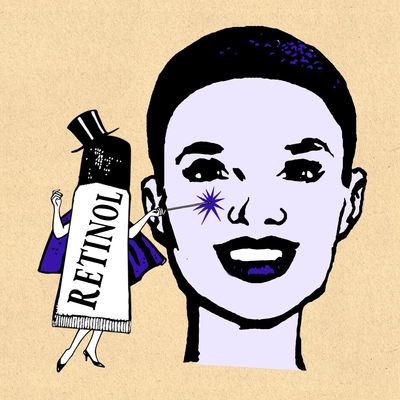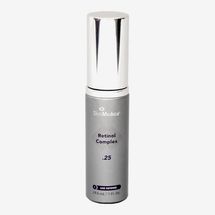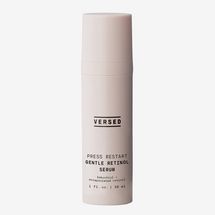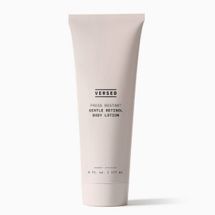
Talking to a skin-care professional about retinol is like talking to a teenage girl about Taylor Swift: The level of admiration borders on worship, and if you’re not already a fan, the proselytizing will begin. Like the singer-songwriter-producer-guitarist-football-ratings-booster, retinol is a multi-hyphenate: It speeds cell turnover, evens out skin tone, promotes collagen production, smooths the look of lines and wrinkles, unclogs pores, improves skin’s overall radiance, and may get you carded at the supermarket. Plus, the price of admission can be as low as Eras Tour movie tickets rather than stadium seats.
Retinol is a specific vitamin-A molecule, but it’s generally used to describe any vitamin-A-derived skin-care product that you can purchase over the counter, including retinaldehyde (more potent than retinol) and retinyl esters (less potent than retinol). For our purposes, we’re going to be purists and talk specifically about retinol and not its OTC compadres.
Update on August 27, 2024: Updated prices and checked stock for all products.
The benefits
It’s an exfoliant
Not a surface exfoliant, like an AHA (read more on what acids do in this explainer on AHAs and BHAs). Retinols exfoliate from the bottom up: “One of the main features of retinol is that it alters the speed of skin-cell turnover,” says TikTok’s favorite dermatologist, Angelo Landriscina, M.D., FAAD, a.k.a. @dermangelo. The younger, fresher-looking skin cells come up more quickly, pushing away the dulling, dead skin cells on top. In doing this, there’s a thinning out of the stratum corneum, the outermost layer of the epidermis, making your skin look dewy and radiant.
It plumps the skin
Retinol stimulates the growth of collagen, the protein that gives your skin structure, and elastin, the protein that makes your skin snap back into place. It also slows the breakdown of existing collagen, resulting in skin that is firmer, plumper, and less lined.
Technically, Landriscina points out, retinol is a cosmeceutical, not a pharmaceutical, and the FDA only allows claims about collagen growth for prescription retinoids. That’s why you will often hear that retinol improves the appearance of lines and wrinkles. However, decades of evidence and plenty of clinical studies show that retinols really do reduce lines and wrinkles.
It helps clear pores and reduce acne
First, a mini-lesson on how pimples are formed, courtesy of David E. Bank, M.D., FAAD, a dermatologist at the Center for Dermatology, Cosmetic & Laser Surgery in Mt. Kisco, New York: Your pores are openings at the skin’s surface where skin cells, hair follicles, and sebaceous (oil-producing) glands reside. Typically, explains Bank, “the skin cells march up and out of the pore alongside the hair follicle. But with acne, the skin cells get ‘sticky’ below the surface of the skin and form a plug. That plug blocks the pore, and when the sebaceous gland tries to pump against this closed manhole cover, it engorges and eventually ruptures” — leaving you with a pimple. What retinol does, says Bank, is “normalize the cell differentiation and maturation process.” Think of retinol as early intervention for a skin cell, making sure that the cell stays on the right path and doesn’t form the plug in the first place so pimples don’t get the chance to form.
It can improve dark spots
In addition to exfoliating away surface hyperpigmentation (areas that are darker than the rest of your skin), retinol can also help prevent their formation. Retinol is what’s called a tyrosinase inhibitor, meaning it limits the production of an enzyme called tyrosinase, which is necessary for the formation of melanin, the pigment in your skin. Less tyrosinase, less melanin, fewer dark spots.
The potential pitfalls
It can irritate the skin
If you’ve never used retinol before, or it’s been some time since you have, it can initially cause dryness, redness, flakiness, and extra sensitivity, in addition to an initial purging of pores that can bring on temporary breakouts. Your skin needs time to adjust to these potential side effects, and this is a process known as retinization. Landriscina recommends finding a line with varying strengths of retinol to make it easier to acclimate, like SkinMedica Age Defense Retinol Complex, which comes in .25, .5, and 1.0 percent strengths.
It has uncertain side effects if you’re pregnant or breastfeeding
High doses of vitamin A have been associated with a risk of birth defects. “There isn’t great evidence that using retinol during pregnancy is going to result in any adverse outcomes,” says Landriscina, “but it’s not ethical to do a retinol study on pregnant people, so it should not be used during pregnancy.” (And if you’re looking for alternatives, we found the best skin-care products to use while pregnant.)
It can be compromised by sunlight
Oral retinoids (like Accutane) are known to make the skin more vulnerable to UV rays. While Landriscina says he hasn’t seen any data showing that retinol can make you more prone to sunburn, “you should be using sunscreen every day anyway!” At the same time, conventional wisdom has us applying retinol at night because retinol has a reputation for being an unstable molecule that can be deactivated by sunlight. But this isn’t always true: Retinol that’s been stabilized with encapsulation maintains its integrity, even when exposed to UV. So if you want to wear your stable retinol (like Versed Press Restart Gentle Retinol Serum for face and for body) during the day, go for it. You just have to be sure to know the difference before you proceed.
The bottom line
It’s worth it
Once your skin settles down — which can take four to six weeks — you’ll be joining ranks of retinol’s massive fan base as a deeply dedicated skin-care Swiftie.
Our experts
• Angelo Landriscina, M.D., FAAD
• David E. Bank, M.D., FAAD
The Strategist is designed to surface the most useful, expert recommendations for things to buy across the vast e-commerce landscape. Some of our latest conquests include the best acne treatments, rolling luggage, pillows for side sleepers, natural anxiety remedies, and bath towels. We update links when possible, but note that deals can expire and all prices are subject to change.








